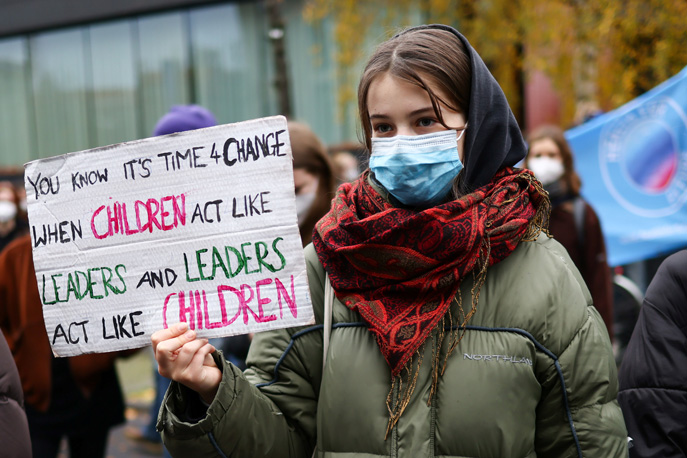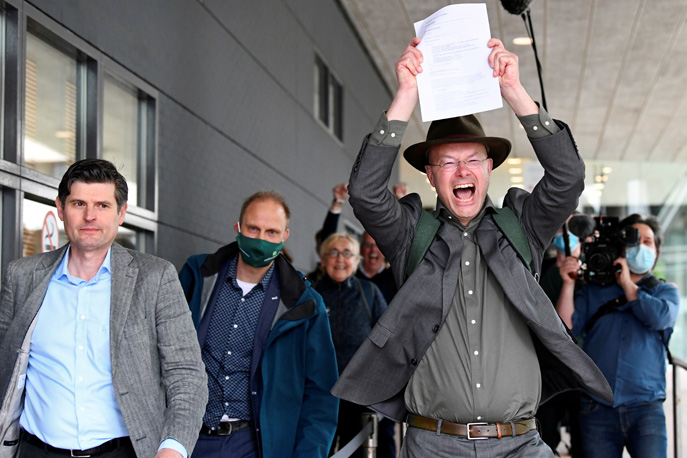Mark Hillsdon reports on how high-profile victories have spawned copy-cat cases around the world. But companies and communities are litigating to block climate action, too
From village communities in Nepal, to young people in Mexico and powerful state legislatures in the United States, litigation is becoming an increasingly formidable tool when it comes to holding companies and governments to account over their contribution to global warming.
Recent successes have seen lawyers from the non-government organisation (NGO) Earthjustice help residents from Richmond, California, prevent coal from being landed at its port, while in New York City they have succeeded in having fossil fuels banned from all new buildings from 2024. Earthjustice also played an instrumental role in halting controversial plans to drill for oil and gas in the Alaskan Arctic.
Most significantly, in January a federal judge invalidated the results of the U.S. government’s sale of oil and gas leases in the Gulf of Mexico, arguing that the Biden administration had failed to account for the climate change impact of the auction.
According to the Grantham Institute’s 2021 Global Trends in Climate Change Litigation Policy Report, the number of climate change-related cases has more than doubled since 2015. Between 1986 and 2014, just over 800 cases were filed, but since then a further 1,000 have been brought before the courts.
When you have positive precedents. it really starts to create a proliferation of cases
Last year alone “an unprecedented number” of judgments with potentially far-reaching impacts were issued, including a ruling that the French government’s failure to meet its own targets around greenhouse gas emissions was contributing to environmental harm.
Also last year, the German Federal Constitutional Court, the country’s highest, found that Germany’s climate protection laws violated the human rights of young people and future generations and must be improved.
The impetus for these cases came in 2019, when the Dutch sustainable transition non-profit Urgenda won a landmark claim against the government of the Netherlands, successfully arguing that the state was taking insufficient action to address climate change, which posed an abnegation of its responsibility to protect human rights.
Urgenda’s Climate Litigation Network supports organisations, communities and individuals pursing litigation against governments over climate ambitions. It details hundreds of cases, including that of Nepalese villagers who forced the government to change track over fossil fuels, and an ongoing case in Mexico, where 15 young people want the government to guarantee their constitutional rights to a healthy environment.

April Williamson, a lawyer at ClientEarth, an environmental charity that uses the law to fight for system change, says: “When you have positive precedents. it really starts to create a proliferation of cases, and people start to get really excited because there's more of a chance that arguments that have been used in another case can be used again (successfully).”
It has taken time for national laws to be adopted around the Paris Agreement, she says, but now they are “providing new avenues for people to hold governments to account if they aren’t able to meet their climate targets”.
In what could be another landmark judgement, ClientEarth is currently suing the UK government for a failure to set out sufficient policies to reach net zero emissions by 2050.
As senior ClientEarth lawyer Sam Hunter Jones says: “It’s not enough for the UK government simply to have a net-zero strategy, it needs to include real-world polices that ensure it succeeds. Anything less is a breach of its legal duties and amounts to greenwashing and climate delay.”
You don't necessarily have to have a climate change law to sue a company, there are other ways
Of course, it is not just governments that are in the sights of groups such as ClientEarth. In May last year, the Netherlands was the legal battleground for another landmark ruling, with the courts this time judging that Shell must cut its emissions by 45% by 2030, against a 2019 baseline; in essence, environmental group Friends of the Earth had forced Shell to align its policies with the Paris Agreement.
The Shell case was based on tort law, explains Williamson, which applies if someone commits a wrong and someone else suffers damages or losses as a result. In this case, by not having an adequate climate strategy in place, Shell was found to be harming Dutch citizens under the country’s civil code.
Many cases are rumbling through the U.S. legal system, too, with state governments using the courts to pursue corporations. The Californian cities of San Francisco and Oakland, for instance, began proceedings in 2017 against BP and several other oil majors, claiming damages to pay for flood defences. Sea level rises are a direct result of global warming, they argue, which in turn is the result of burning fossil fuels. Nearly five years on, and the case continues.
As courts become more familiar with the concept of climate change, consumer protection laws are also coming into play. In Massachusetts, the state attorney general is pursuing ExxonMobil through the courts, arguing that consumers have been misled, as the oil company didn’t tell them what the impact of buying and using their fuel would be. “You don't necessarily have to have a climate change law to sue a company, there are other ways,” says Williamson.

“There has been a huge amount of creativity in the litigation space about how governments and organisations can bring corporates to account.”
In Washington DC, the state government has filed against several oil companies, claiming they had known about the link between fossil fuels and climate change since the 1950s but failed to act, and have since continued the deception by exaggerating their commitment to green energy. In Delaware, state authorities are pursuing 31 fossil fuel companies, claiming they deceived people over the climate crisis.
Earthjustice has been using the courts to challenge fossil fuel projects since 1971. It works with frontline organisations and communities that are already being impacted by climate change. But rather than taking on a government’s broader failings to act, it opts to work on individual cases.
“It is those project-by-project cases and challenges that have made the difference,” explains international programme director Martin Wagner. Quite often the cases do not reference climate change. In Indonesia, for instance, Earthjustice recently brought a successful suit against the government for its failure to enforce strict air pollution standards in Jakarta.
Delaying a carbon-emitting development can mean it never gets built, simply because greener technologies are moving so quickly. Delay is actually our friend
“There wasn't much talk about climate, but in order to achieve cleaner air, they are going to have to address the coal-fired power plants that ring the capital,” he says.
Working with the Centre for Environmental Rights in South Africa, Earthjustice has been challenging the government’s decision to tackle the country’s ubiquitous blackouts by burning more fossil fuel.
The country’s Integrated Resource Plan (IRP) proposes 15 megawatts of new coal-fired generation, and 3,000 gigawatts of gas generation, explains Wagner, including mooring so-called power ships – essentially floating gas plants – off the coast. Earthjustice argues that rather than promoting clean energy and meeting its commitments around climate change, the South African government is actively going out of its way to promote fossil fuels.
Wagner is also preparing for legal action in Argentina, where companies are circling in a bid to start tapping what are thought to be the world’s largest reserves of fracked gas.

But winning isn’t everything, says Wagner. Just having their day in court can have an impact. While corporations have always been adept at finding loopholes in laws and regulations, often “slow playing” things to delay and stall proceedings, when it comes to climate change, can work in favour of groups such as Earthjustice.
“Delaying a carbon-emitting development can mean it never gets built, simply because greener technologies are moving so quickly, that it's no longer necessary. Delay is actually our friend,” he says. “Litigation also draws the attention of the government and the public to the corporation's behaviour,” which can deter potential investors and alert regulators.
“If we are able to shift the minds of government decision makers in a broader way... or if we can shift the public perception so that they are paying attention to what the government is approving... then that's a victory,” he says.
The litigation is also being used to obstruct climate policy, too. In another high-profile Dutch case in the Grantham Institute report, the Germany utility company RWE is suing the Netherlands government for introducing policies that they say haven’t given them enough time or resources to move away from fossil fuels.
Governments are facing legal action for both their actions and inaction
While companies face potential reputational damage for making such challenges, explains the report's co-author Joana Setzer, they also believe they need to defend themselves and claim the compensation they feel is due.
This sort of action shows just how complex the picture is becoming, with governments facing legal action for both their actions and inaction, she adds.
Then there is the growing number of just transition cases, covering issues such as the location of wind farms, and jobs lost as a result of fossil fuel investments being wound down, meaning individuals and communities often unwittingly oppose climate policy.
One thing is for certain, there will be no shortage of jobs for lawyers in the energy transition, whichever side of the debate you are on.
Mark Hillsdon is a Manchester-based freelance writer who writes on business and sustainability for The Ethical Corporation, The Guardian, and a range of naturebased titles including CountryFile and BBC Wildlife.
This article is part of The Ethical Corporation’s March 2022 Energy Transition briefing: See also:
As energy security concerns trump climate, will drive to cut methane be derailed?
Why indigenous people could be critical to ensuring EV doesn’t run out of road
Activist investors vow to keep climate in their sights, despite war in Ukraine
How Australia could help Europe solve its low-carbon energy quandary
‘We’ll be producing green steel in commercial quantities by 2026’
Will Ukrainian crisis help bring nuclear in from the cold?
Weather set fair for offshore wine in U.S.
New life injected into ambition of capturing CO2 from air
Grantham Institute Earthjustice Urgenda climate litigation ClientEarth Shell Friends of the Earth


